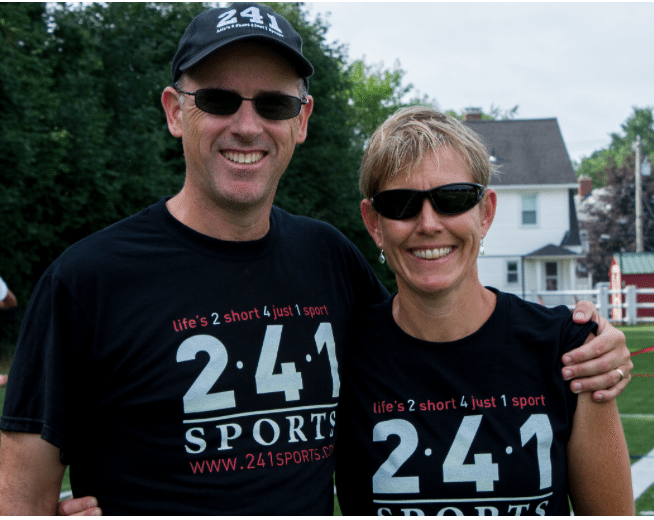September 18, 2015
WYC 056 – Sport Sampling – Steve Boyle talks Life is 2 short 4 just 1 sport
What does it take to be a winning youth coach? Listen in as Steve Boyle shares stories and discusses his journey to becoming a successful youth sports coach.
Steve is a former Division 1 basketball player (Manhattan College). In NYC and Seattle, WA, he coached soccer, basketball, track and field and x-country. In Seattle, he founded Boyle’s Cougar Hoop Camp for Girls, the largest all-girls camp in the state of Washington at the time. He was a school counselor at Hall High School in West Hartford for 15 years where he has coached Varsity basketball, track and field, freshman and JV soccer. He is currently a counselor at King Philip Middle School, coaches youth basketball, assists with track and field at Hall High and is Partner at the Crossover Consulting Group.
Steve and his wife Kerry started their first camp in 2008, and only 4 summers later, the camp was declared “Best Summer Camp” in Hartford Magazine’s Readers Poll and their programs have received tremendous positive coverage from area media outlets. Now over 1000 kids have come to recognize that “Life’s 2 Short 4 Just 1 Sport” and kids from throughout the U.S. and beyond are attending their programs.
Website: 241Sports.com
Facebook: /241SportsLLC
Twitter: @241Sports
Listen Now:
Listen in ITunes: Itunes link
Listen in Stitcher: Stitcher link
Quote
‘It’s perfectly OK to let kids know that winning is an expected outcome of competition. The problem becomes when we focus too much on the value of the win as opposed to the value of the experience.’
Coaching your own Kids
HUGE IDEA #1
- Talk about the elephant in the room – Don’t work too hard to treat your own kid as a coach – it’s good to be truthful and authentic in front of the team and treat your own kid from a parenting point of view sometimes. Don’t be over the top – but kids enjoy and learn from watching you enjoy spending time with your child.
My Cringe & ‘Ah-Ha’ Moments
- Steve shares a great story about his team having to help rescue a man from the river – and how he fainted afterwards.
Teaching Children & Keeping it Fun
- Teaching is 85% about relationships. Connect with the kid first – then you just need to stay one step ahead of them regarding the technical skill teaching.
- Consider the cross-over effect. Know what sports kids have played then use their knowledge from the other sport to teach.
- Make all drills competitive – they are not fun if they are not.
Self-Confidence and teaching kids to achieve peak performance
- Visualization – Your mindset is a choice. ‘Look at everything as an opportunity to enjoy the moment and have no regrets.’
Culture – Creating a Winning Attitude
- Discipline – First impressions are really important. Don’t have a policy that says ‘you can only miss 2 practices’ – that sets up the expectation that it is OK to miss 2 practices. Coach doesn’t expect to have any discipline issues, so predominantly – he doesn’t. It’s not allowed.
- Coach Boyle doesn’t use running as a punishment – that doesn’t mean they don’t run gassers- but if they do it’s because they need to be in great shape.
- Rewards – Coach starts every practice in a circle – and he shares about his day, and they share about their day. This allows everyone to get a pulse for where everyone’s mentality is that day.
HUGE IDEA #2
- Coach asks every kid to write him a letter after each season – evaluating their experience on the team, and his performance. He reads and keeps them all and uses the feedback to improve
Connecting with Kids
- Influence the influencers. One of Steve’s former players is now a Major in the army – and he wrote to Steve telling him that many of the leadership skills he uses with his men in the army are skills he learned from watching how Steve coached.
Winning
HUGE IDEA #3
- Sports games are not fun without a winner and a loser. But if you hear ‘it’s too competitive, it’s not fun’ – but the ‘too competitive’ part comes from the projection of the adult onto the kids. It’s perfectly OK to let kids know that winning is an expected outcome of competition. The problem becomes when we focus too much on the value of the win as opposed to the value of the experience.
- Focus on the process, not the winning.
The One that Got Away
- Steve remembers his last high school basketball team where another team took away the 2 best scorers on his team, and he wasn’t really prepared to be the primary scorer so he didn’t shoot very well. Lesson – always be prepared to step up.
Best Stolen idea
- The power of the assistant coaches. Especially how much they can care for players – Steve had several assistant coaches when he played college ball that really cared for him and his teammates and Steve saw the power in that.
2-4-1 Sports
- Every organization agrees – kids should be playing more than one sport
- Recognized by the Aspen Institute’s Project Play as 1 of 8 model programs in the U.S.
- Sport sampling – they have found that if a kid can try a sport, without having to commit to an entire season – they often find new sports they really enjoy that they might not have tried otherwise.
- Currently in Connecticut, starting programs in Denver and Pasadena.


